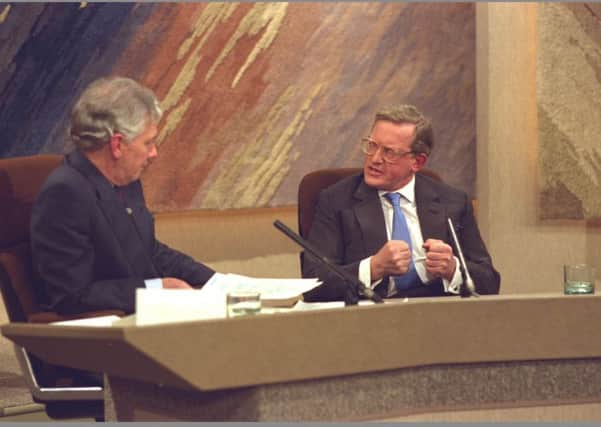Declassified files: Mystery over bizarre Dublin bid to block appearance with Gay Byrne


For reasons which remained unclear to the British Government, the Irish Government escalated the appearance on Mr Byrne’s popular TV talk show to the highest diplomatic levels, relaying messages via the British ambassador to Dublin.
In early 1989, the talk show host had personally invited Secretary of State Tom King to appear on The Late Late Show and Mr King agreed to take part.
Advertisement
Hide AdAdvertisement
Hide AdBut the seemingly trivial appearance, at a time when Mr King was regularly interviewed by robust political journalists, created a diplomatic storm.
The British ambassador, the hugely experienced diplomat Sir Nicholas Fenn, firmly believed that he episode was instigated by the then Taoiseach, Charlie Haughey.
Mr King had agreed to take part in the programme on 17 February. But, after a week of inter-governmental communications about the issue, the day before the broadcast a confidential last minute cable from the British Embassy in Dublin to the Foreign Office in London relayed the Irish Government’s firm views.
The 16 February cable from the ambassador, which came after initial discussions between the two governments about the issue, has been released at the Public Record Office in Belfast under the 20 Year Rule.
Advertisement
Hide AdAdvertisement
Hide AdIt said: “The Irish Government, having considered our views, repeats its hope that Mr King will not appear on the Late Late Show on 17 February.
“On Mr King’s instructions, I telephoned [senior Irish official] Noel Dorr from London on Monday 13 February and made the following points:
“A. In light of Mr Lenihan’s [the Tanaiste] concurrence at the IGC [Inter-Governmental Conference], Mr King has now accepted Gay Byrne’s invitation and his staff had discussed the modalities with RTE. It was difficult to see how he could now withdraw. If he did so, there was a danger of a leak.”
“B. The Irish advice was incongruous, besides the assurances we were receiving of the full safety of witnesses coming to testify in Dublin [in extradition hearings].
Advertisement
Hide AdAdvertisement
Hide Ad“C. If he were not to fulfil the television engagement, Mr King was not sure that he should come to Dublin this weekend at all.
“D. As we understood it, Gay Byrne’s intention was to present a personal portrait of the Secretary of State rather than a political programme. It was not Mr King’s intention to make waves.”
He said that Mr Dorr had phoned him back two days later to give him “the Irish Government’s considered response”, having discussed it with Irish ministers.
Mr Dorr proposed that the Secretary of State come to Dublin as for lunch with the Tanaiste and to be his guest at the Ireland-England rugby match.
Advertisement
Hide AdAdvertisement
Hide AdHe said that the Irish saw no benefit, but did see “negative aspects” to him going ahead with the interview.
And, in what is attributed to Mr Dorr as a direct quote of striking directness, the cable relayed the Irish position: “If he comes, he will not come with our approval.”
The cable went on: “Dorr kept repeating the point that this would be a departure from established practice which the Irish would not welcome...he did not say whether the Irish view was specific to this weekend or to this particular programme. Better not to probe too closely.”
Then, in his own comment on the situation, the ambassador said: “This is clearly the hand of the Taoiseach. The specific reasons do not hold water. The Garda have told us that they see no security difficulty in the match following the programme, and RTE can handle the studio audience.
Advertisement
Hide AdAdvertisement
Hide Ad“Fidelity to an established pattern is not a reason. I suspect that the real reason is Mr Haughey’s fear that a successful interview would enhance Mr King’s reputation in republican Ireland.”
However, despite dismissing the core of the Irish objection, the ambassador went on to advise that “it would be counter-productive to insist on appearing on this programme against the sustained Irish objections. I hope therefore that Mr King will acquiesce”.
He concluded by saying that the Secretary of State should still come to Dublin for the rugby match, adding: “Not least, it would be worth comparing notes with Mr Lenihan about the sad implications of this Irish pettiness.”
However, the Irish entreaties merely delayed rather than halted Mr King’s appearance on the programme.
Advertisement
Hide AdAdvertisement
Hide AdUltimately, the Secretary of State was interviewed on The Late Late Show on 10 March 1989.
His successor, Peter Brooke, also appeared on the programme three years later where he infamously was persuaded to sing “Oh My Darling, Clementine” on the day of the Teebane Massacre in which seven building workers were murdered by the IRA.